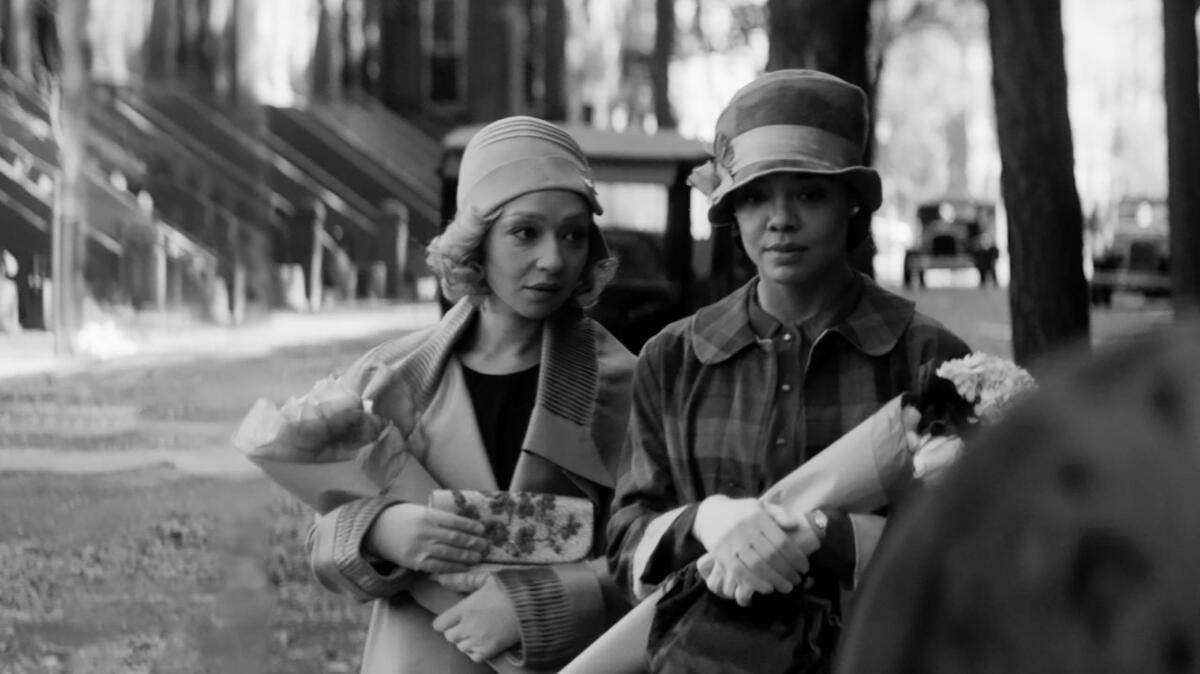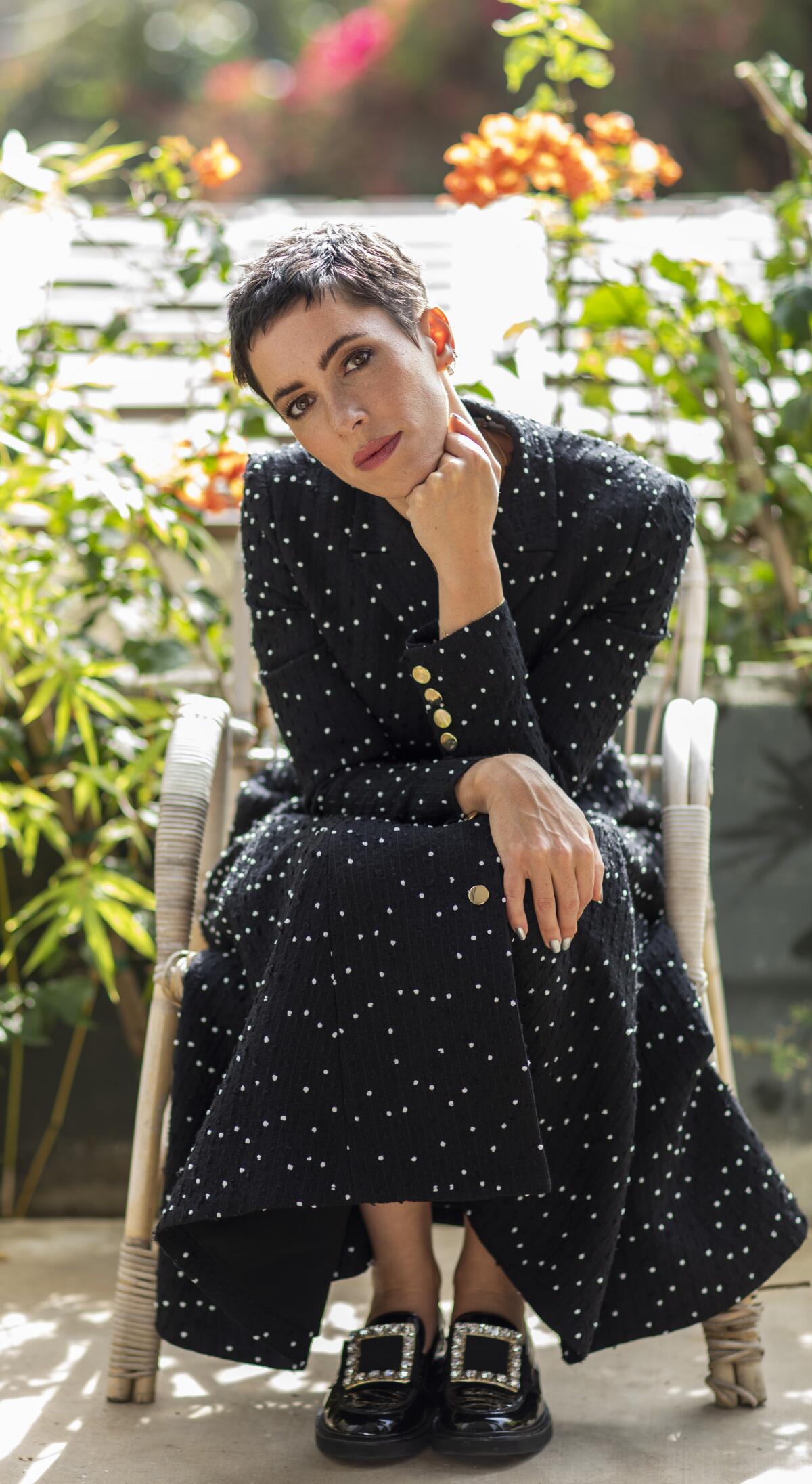‘Passing’ keeps its writing simple, asking viewers to lean in for greater understanding

- Share via
My adaptation of Nella Larsen’s “Passing” had a slow birth, even by the often glacial standards of script development. When I started writing, I was an actress in my 20s with vague but fervent aspirations to one day direct. I wrote the first draft in 10 days, immediately after first reading the novel, in something of a fugue state. I was fascinated but also mystified by that fascination, and my first draft was crude and impractical. I didn’t think for a second that I would ever have the means or the courage to turn it into a film.
In retrospect, I probably could never have written it otherwise. Over the years, I tinkered, adjusting it radically and then minutely and then radically again until it became something of a piece of me — not so much a project or a process as a thing that I have lived in dialogue with for the better part of my adult life.
The main challenge of the adaptation revolved around the character of Irene. Contemporary reviewers often missed both Irene’s centrality and her fundamental unreliability. Clare, the object of Irene’s obsession, was frequently taken to be the main character, rather than one half of the extraordinary — and extraordinarily complicated — relationship that drives the action.

Crucially, it isn’t Clare’s passing per se that interests Larsen, but rather what Clare’s passing means to Irene, how Clare’s strange freedom reflects Irene’s loneliness and repression. Unless Irene’s judgment and fear of Clare is seen in the context of her desire to be and possess her, there isn’t anything to the story but a conventional passing morality tale. That isn’t what Larsen wrote, and that wasn’t the film I wanted to make.
The trouble with Irene is that she’s so deeply repressed; even if you could hear her inner voice, she still wouldn’t be telling the truth. I couldn’t give her an expository monologue without betraying the essence of the character. I needed the audience to see a woman who is very near the brink of madness, but presenting a face to the world that is highly functional, even impressive.
In their own words: Tony Kushner, Rebecca Hall, Jeymes Samuel and other screenwriters take us on a journey through writing their film scripts.
I needed to dramatize Irene’s interiority, but I also wanted to honor Larsen’s economy. She expects a lot from her readers, demanding that they lean in and interpret the action. I wanted my film to make that same kind of demand on the viewer. I had to use a variety of tactics to make my Irene’s internal conflicts and unreliability visible on-screen. Ultimately, I did my best to build my script and my film, not so much out of language as out of small moments of behavior. In part, this is what took me so long to achieve a script that was as lean as I knew how to make it.
The first time we see Irene, she’s hiding under a hat, edgily peering out at the world. Unlike Clare, who passes with complete confidence, when Irene passes, it’s as if she’s wearing a hastily assembled disguise, constantly expecting to be discovered. She’s nervous, even a little sketchy. In a hotel tea room, she applies powder at her table surreptitiously, as if anyone who saw a woman refreshing her makeup might call the police immediately. Finally home with her husband after an intensely stressful day, she climbs into his arms, and he asks if he’s dreaming.
Are things all right between them? In a later scene, she pulls out of a kiss, pushing him away. We linger on his face long enough to see that this isn’t unusual. She picks him up from work and the two of them argue, but rein it in when they see that they’re being watched. Not only do they care how they’re perceived, even in a fraught moment, but when we shift perspectives, all we see is a handsome young couple in a nice car, two people doing an excellent job of pretending. However, we’ve seen the way she removed his hand from her leg, and we already know there’s more to the story.

The trick to any adaptation, I think, isn’t literal faithfulness to the original text but to the spirit it embodies. After all the years I spent in dialogue with this small yet mighty novel, I sometimes get confused as to what words were my invention and what were lifted straight from the book. Going back to the text, I’m often surprised to find that something I thought was Nella’s is mine, and vice versa.
But the spirit of ambiguity and simplicity that shines through in the book were my guiding lights, and time was my enabler. With every year, I was able to chisel at the screenplay, remove the fat and allow for only what was absolutely necessary. So although a gestation period of 13 years was probably unnecessary (and one I hope never to repeat), it is that time that counterintuitively gave me the opportunity and the confidence to tell this story as simply as I could.
More to Read
From the Oscars to the Emmys.
Get the Envelope newsletter for exclusive awards season coverage, behind-the-scenes stories from the Envelope podcast and columnist Glenn Whipp’s must-read analysis.
You may occasionally receive promotional content from the Los Angeles Times.











